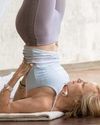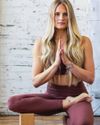Here’s what science tells us.

AT SOME POINT, most yogis will be cautioned during Sun Salutations or vinyasas to “never jump back to Plank Pose—only to Chaturanga Dandasana (Four- Limbed Staff Pose). But this warning doesn’t exist in the fitness world, where jumping back to Plank is part of one of the most popular bodyweight exercises: the burpee.
This basic exercise is simple— start standing; jump straight up; bend forward, and place your hands on the ground; jump back to Plank, then hop your feet to your hands, and repeat. Sound familiar? Eliminate the initial vertical jump, add a backbend (Cobra or Upward- Facing Dog) and Down Dog, and you have a classic Sun Salutation.
According to Mark Singleton’s book Yoga Body, it was Tirumalai Krishnamacharya—the grandfather of Western yoga—who borrowed the jumpback to Chaturanga from Western gymnastics in the 1930s while he was developing the system that became Ashtanga Yoga. With most modern forms of vinyasa and Power Yoga springing from the Ashtanga lineage, jumping back to Chaturanga became widespread and is now included in most vigorous yoga classes in the West. But given the shoulder and wrist injuries that are emerging lately, it seems like a good idea to revisit a few commonly circulated misconceptions about the biomechanics of the transition.
First, let’s look at one myth you’ve likely heard: Jumping to Plank is jarring on your joints, forcing your wrists, elbows, and shoulders to absorb shock that would otherwise be dispersed by bending the elbows into Chaturanga. This misconception seems to be based on the false premise that because Plank Pose is a bonus tacked position, the ligaments and tendons within your wrists, elbows, and shoulders must absorb more impact on the landing than they would in Chaturanga.
This story is from the May 2018 edition of Yoga Journal.
Start your 7-day Magzter GOLD free trial to access thousands of curated premium stories, and 9,000+ magazines and newspapers.
Already a subscriber ? Sign In
This story is from the May 2018 edition of Yoga Journal.
Start your 7-day Magzter GOLD free trial to access thousands of curated premium stories, and 9,000+ magazines and newspapers.
Already a subscriber? Sign In

Learning to Hear the Voice of Self-Care
How to discern what really matters.

Inclusive Yoga for All
A Down syndrome diagnosis set this family on a path to make yoga accessible to everyone.

For the Joy of Practice
Doing yoga without attachment to the outcome can bring unexpected gifts.

Be Kind to Your Spine
Your vertebral column is a series of complex, interconnecting parts that support your every movement. Here's how to keep it safe.

A Skeptic of Chakra Balancing
The experience helped me make peace with things that can't be explained.

Are We Having Fun Yet?
Bring play back into your practice with three styles of yoga that can get you out of your head and bring a smile to your face.

12 Ways to Use Blocks You've Probably Never Tried Before
The beauty of blocks? They not only meet you where you are in your practice, they take you beyond where you ever thought you could go.

THE SCIENCE OF AWE
THOSE MOMENTS IN LIFE THAT STOP YOU IN YOUR TRACKS IN ASTONISHMENT? RESEARCH SAYS EXPERIENCING MORE OF THEM CAN CHANGE YOUR LIFE.

What Your Doshas Say About Your Dharma
Ayurveda can explain so much more than what's out of balance.

The Future of Yoga
Yoga has been evolving for thousands of yearsfrom a mind-and-body spiritual practice to a billion-dollar "lifestyle" practice. What's next? We asked futurists, teachers, and thinkers what to expect in the next decade and beyond.